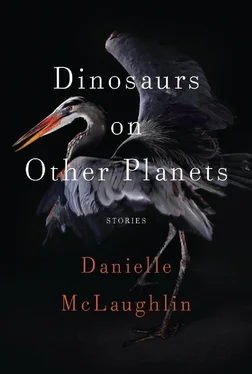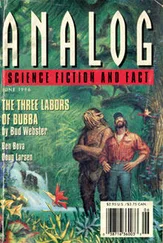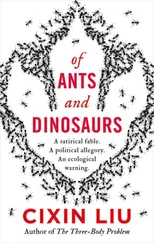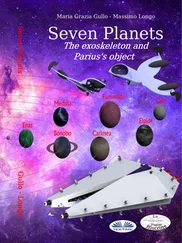“Bad birdie,” Gracie said. “Bad, bad birdie,” and she stamped her foot.
He wanted to say that it was winter, that the bird was only doing what it always did, what it had to do. That there had never been any hope for those unwitting koi, here in this desolate place where even the river fish struggled to survive. Cathy picked up the ax. “What are you doing?” he said.
“We’re going to keep the fish safe. We’re going to build them a cage, like in the zoo. Right, Gracie?” When she brought the ax down, the end lodged in the lawn and she leaned on the handle, worked it like a lever, until another sod broke away. She flipped it over to reveal a tangle of roots on the underside. She was not wearing a coat or even a cardigan and her arms were purple and goosebumped. So, too, were Gracie’s, he realized. The hem of her dress had trailed in the pond and the wet was soaking upward.
“Let’s leave it awhile and go inside,” he said.
Cathy stopped hacking at the lawn. He saw how she was looking at him, confusion in her face, trying to work out if she had displeased him. “It’s okay,” he said. “It’s cold, that’s all. We can see about it later.” He took Gracie by the hand and began to walk toward the house, Cathy at his side.
“I rang earlier,” he said. “I tried a few times.”
“Did you? We’ve been out here most of the morning, haven’t we, Gracie?”
Gracie nodded solemnly at her mother. “Poor fishy,” she said again.
At the front door, Cathy took off her boots, left them on the step. “I’ve been thinking,” she said, “about the daycare. It’s a lot of money for Martha to come up with every month. And we don’t really need it anymore, do we? I mean, I’m fine now. I can manage.” She ruffled her daughter’s hair. “We had fun this morning, didn’t we? Just Mummy and Gracie?”
“We don’t need to decide about the daycare now,” he said. “We’ll talk about it over the weekend.”
Inside the house, Gracie toddled down the hall after her mother. He glanced at his watch, saw that the Manchester meeting was about to start.
“You might as well stay for lunch now that you’re here,” Cathy said.
“Sure,” he said. “Why not?”
Upstairs in their bedroom, he took off his jacket and threw it on the bed. In the en suite bathroom, he opened the cabinet and took out the box containing Cathy’s medication. He counted the pills in their blister pack: exactly the right number, neither too many, nor too few. He splashed water on his face and lay for a while on the bed with his eyes closed. In the inside pocket of his jacket, his phone beeped. He had three messages: a text from the in-house travel department, with booking references for flights and hotels, three nights in Manchester and then — something that had not been mentioned previously — two in Birmingham; a brusque voicemail from Martha, saying she was on her way to check on Cathy; and one from Cahill, asking where the hell he was. He switched off the phone, put it back in his jacket pocket, and went downstairs.
In the kitchen, Cathy was frying onions and cubes of bacon in a pan. “I thought we’d have omelets,” she said. “Something quick, so you can get back to the office.” She stood Gracie on a stool beside her and rolled up the child’s sleeves. He watched Gracie smash an egg against the edge of the bowl. Half of it slipped over the rim onto the countertop, the rest, studded with fragments of shell, slid into the bowl. Cathy dipped a finger into the raw egg, fished out shards of shell. There was a determined cheerfulness to the way she moved between stove and cupboard, gathering ingredients, a grim precision to the way she chopped another onion. He noticed that she had applied lipstick while he was upstairs, and her hair was brushed. “Why don’t we eat in the dining room for a change?” she said. “Gracie’s going to help me set the table, aren’t you, Gracie?” And she lifted the child down from the stool and led her away by the hand.
He stayed by himself in the kitchen, keeping an eye on the omelets, every so often shaking the pan to stop them catching. Through the window, he saw the frost retreating toward the mountains to the west, remnants of it forming an erratic patchwork on the bonnet of Cathy’s car outside the shed. After a few moments, he took the pan off the heat and went to the door of the dining room, a rarely used room on the other side of the hall.
Cathy was at the end of the table, bent over a large silver tray. It was something they had found in a market in Dublin before they married, and it held items of crystal they had received as wedding presents. Cathy picked up a glass, held it to the light, ran a finger along the rim to check for cracks. She polished it with a tea towel, then set it down on the table and took up another. Gracie was arranging red table napkins, folding them and folding them again, pressing them down, protesting as they sprung open when released. Cathy looked up and smiled. “I thought we’d open a bottle of wine,” she said. “You could have a glass with your lunch. One glass won’t make any difference.”
“I guess not,” he said. Through the dining room window, he saw Martha’s silver Volvo turn into the driveway. It came to a halt by the ruined pond, and he watched as Martha rolled down the window and stared for a while before continuing on toward the house. “What a lovely surprise,” Cathy said. “And she’s just in time for lunch.” She left the crystal and went past him into the hall to welcome her sister.
Gracie, finished with the napkins, slid down from her chair. She was looking not at her father but about the room, ready for whatever opportunity might next present itself. There was a determined jut to her chin that didn’t come from his side of the family and that always reminded him not so much of Cathy but of Martha. She headed now, with purpose, toward the tray of crystal. In an instant, she had reached up a small hand and grabbed the corner of a linen napkin on which rested a tall decanter in blue cut glass. She tugged at the napkin, and the decanter, unbalanced, began to topple sideways. “Gracie!” he heard Martha shout from behind him. But he was watching, as he was always watching, and he was there, just in time to catch it before it fell.
They stopped for diesel at a filling station outside Abbeyfeale. It was late evening, dusk closing like a fist around two pumps set in a patch of rough concrete and a row of leafless poplars that bordered the forecourt. Kavanagh swung down out of the cab and slapped the flank of the lorry as if it were an animal. He was a red-faced, stocky man in his late thirties. As a child he had been nicknamed “Curly” because of his corkscrew hair, and the name had stuck, even though he was now almost entirely bald, just a patch of soft fuzz above each ear.
There was a shop with faded HB ice cream posters in the window and boxes of cornflakes on display alongside tubs of Swarfega and rat pellets. “Fill her up,” Kavanagh said to the teenager who appeared in the doorway. Then he spat on the ground and walked around the back of the building to the toilet.
Gerard stayed in the cab and watched the boy, who was about his own age, pump the diesel. The boy was standing well back from the lorry, one hand holding the nozzle, the other clamped over his nose and mouth. When his eyes met Gerard’s in the side mirror, Gerard looked away.
Three months in and he was still not used to the smell. The fish heads with their dull, glassy eyes; the skin and scales that stuck to his fingers; the red and purple guts that slipped from the fishes’ bellies. The smell of dead fish rose, ghostlike, from the meal that poured into the factory silos. Gerard shaved his hair tight, cut his nails so short his fingers bled. At night in the pubs in Castletownbere, he imagined fine shards of fish bone lodged like shrapnel beneath his skin, and tiny particles of scales hanging in the air like dust motes. The smell didn’t bother Kavanagh, but then Kavanagh had been reared to it.
Читать дальше












